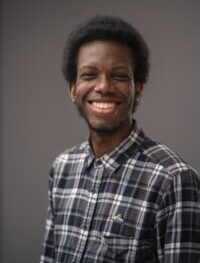Graduate student KeShawn Ivory on leadership team of Black in Astro
The group recently won the Annie Maunder Medal for outreach or public engagement in astronomy or geophysics from the Royal Astronomical Society

KeShawn Ivory, a second-year graduate student working toward a Ph.D. in astrophysics, is co-director of events for Black in Astro, an organization that celebrates and amplifies the Black experience in space-related fields. The group recently won the Annie Maunder Medal for outreach or public engagement in astronomy or geophysics from the Royal Astronomical Society. Here’s a Q&A with Ivory.
Q. Where and when did you receive your undergraduate education and what was your major(s)?
A. I received my undergraduate degree in fall 2018 from Rice University and it was a B.A. in astronomy and French studies.
Q. You’re currently on the leadership team of Black in Astro. How long have you been involved with the group?
A. Yes, I am the co-director of events for Black In Astro, along with my other co-director Dakotah Tyler who is a Ph.D. candidate in astrophysics at UCLA. I’ve been on the leadership team for BIA since January 2021, so right at about two years, and the organization as a whole got its start in June 2020.
Q. Tell us more about Black in Astro. What is the group’s mission?
A. Black In Astro is both a grassroots organization and a community founded by, and for, Black space professionals and students. Black In Astro exists to support, nurture, and create new scholarship opportunities for people of the African diaspora globally. We take pride in fostering joy and celebrating authenticity for all Black folks interested in pursuing a career in space.
Simply put, Black In Astro wants to get more Black people into space, whatever that means for them!
Our purpose is to provide a sense of community in academic and professional spaces where Black people historically have not been welcome. We do this through our advocacy, outreach, and programming. We have successfully hosted a week of virtual programming known as Black Space Week every year around Juneteenth since 2020 and will continue to improve our flagship event as we aim to transfer from virtual experiences to in-person and hybrid experiences. Lastly, we are working to expand our ability to provide academic and research funding to Black scholars.
Q. Black in Astro was recently awarded the Annie Maunder Medal for outreach or public engagement in astronomy or geophysics from the Royal Astronomical Society. Congrats! What does this award mean to the group?
A. Thank you for the congratulations! The fact that the Royal Astronomical Society includes an outreach medal among the medals awarded annually is in and of itself a great sign, as it signals that the Society and the field of astronomy in general recognize the importance of making sure everyone can access information about the cosmos that we share. The fact that BIA specifically won this year’s Annie Maunder Medal is even more exciting to us, because it represents the acknowledgment that Black folks have been systemically disadvantaged in education broadly, not to mention astronomy and physics, for far too long. Actively rewarding work done to correct this social failing is absolutely a step in the right direction. Of course, the fact that the Royal Astronomical Society is UK-based speaks to the international relevance of our organization, and in fact our social media director Cheyenne Polius is actually Saint Lucian and living in the UK!
Q. Why is being involved in Black in Astro important to you?
A. Being involved in BIA is important to me because I remember feeling incredibly isolated in my physics classes as an undergraduate. Being connected to a network of Black people also seeking out space-related careers or trying to get into graduate school for astrophysics would have been perspective-shifting. Learning about space law and space policy and all the options that exist if I wanted to change my path would have been so reassuring. And knowing that there are Black people in these fields as well would have comforted me.
Clearly, I made it work. I’m here at Vanderbilt working toward my Ph.D., but I don’t believe it should have been this difficult and isolating, or that career paths should be so nebulous and mystified. As an organization we are working to ensure it doesn’t stay that way.
Q. What kind of research have you performed or are currently working on?
A. I’ve been fortunate enough to do a few different projects over the years. As an undergrad, I worked for a summer on statistical analysis of a pipeline that takes in data about a star’s light and returns estimates of physical properties of that star such as its temperature and composition.
For my Master’s, obtained from Fisk University through the Fisk-Vanderbilt Master’s-to-Ph.D. Bridge Program, I worked on an algorithm to determine which galaxies in a simulated sample live in the same gravitationally-bound group within a clump of dark matter we call a “dark matter halo.”
At present, I’m using cosmological simulations to characterize statistical distributions of orbital properties of galaxies that orbit other galaxies, so called “satellite galaxies.”
Learn more about Black in Astro on their website, through a recent article in Nature, or connect with them on Twitter, Facebook, or Instagram.
